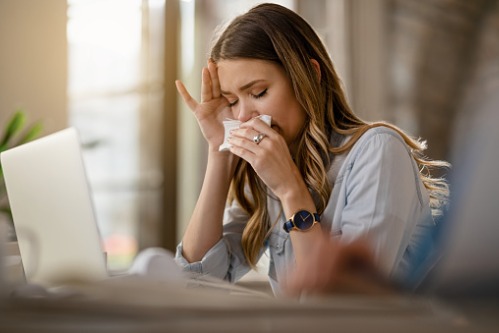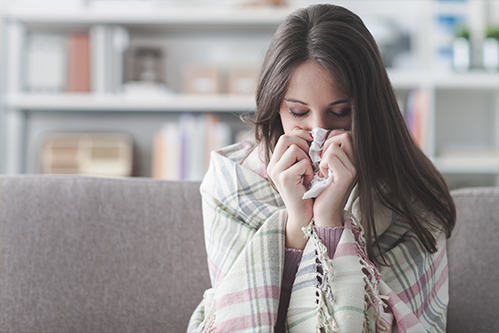
COVID-19 vs. Allergy Symptoms: Telling the Difference
As trees and flower buds release high pollen counts, allergy symptoms are flaring up at the same time as the spread of the novel coronavirus, COVID-19. Since they share similar symptoms, such as coughing, many people are having a hard time distinguishing between allergies and the virus. Here are some ways to tell the two apart.
COVID-19 Symptoms
According to the CDC, people with COVID-19 have reported a wide range of symptoms, from mild reactions to severe illness. Symptoms of COVID-19 include:
- Fever or chills
- Fatigue
- Cough
- Shortness of breath or difficulty breathing
- Muscle or body aches
- Loss of taste or smell
- Congestion or runny nose
- Nausea or vomiting
These symptoms usually appear 2-14 days after exposure to the virus. COVID-19 is spread through coughing, sneezing and close personal contact, so it is important to continue following the CDC guidelines and practice social distancing. If you have any of the above symptoms or if you’ve come in contact with someone who has COVID-19, contact your primary care physician.
Allergic Rhinitis Symptoms
Allergic rhinitis, also known as hay fever, is an allergic reaction to specific allergens, such as pollen or dust mites. Nearly 10 to 30 percent of all adults in the U.S. and 40 percent of children are affected by allergic rhinitis. Symptoms of allergic rhinitis include:
- Cough
- Itchy sinuses, throat, or ear canals
- Watery and itchy eyes
- Rash
- Postnasal drainage
- Runny or stuffy nose
Allergic rhinitis can be caused by:
- Pollen
- Dust mites
- Animal dander
- Mold
An easy way to tell COVID-19 from allergies are the itchy symptoms, such as itchy eyes, nose and throat. If you are experiencing these symptoms, they are most likely due to environmental allergies and not COVID-19.
If you experience cold or flu-like symptoms, such as fatigue, body aches or especially fever, there is a chance it may be COVID-19. It is always safer to get tested than risk spreading the virus to others in your community. If you suspect it may be COVID-19, contact your primary care physician for testing.
With allergy skin testing or blood testing, we can discover hidden allergens, confirm suspected allergens, and provide additional treatments, including immunotherapy. Contact Northeast Allergy, Asthma & Immunology to schedule your appointment.



